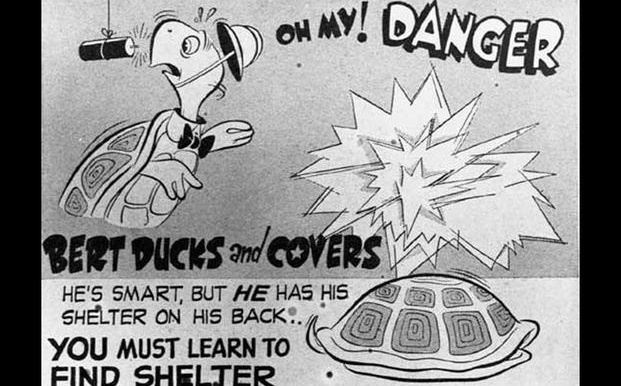The Bomb

Photo Credit: U.S. Civil Defense Administration photo
The Bomb. That word. It has so many connotations now. A thing that holds super powers at loggerheads, a term for something or someone that is way cool - You are The Bomb, and a force capable of destroying the planet, decimating cities in minutes and leaving radioactive cancer causing dust for years of devastation. Ban the Bomb was a watchword of the 60s post-war, post-Hiroshima generation. I remember marches and protests with that slogan. The Bomb ended World War II allowing people all over the world to get back to work, many of them to move on to building families, and the Baby Boom. My own parents married shortly after the war ended and my older siblings are post-war, post-bomb, Boom babies. I am a Boom baby but a little farther down the line. So, for me, the bombing of Hiroshima and Nagasaki was ancient history, a mere story. And yet, the threat of nuclear war was a part of life, just as the threat of hurricanes or snow storms, loomed in the distance, that Bomb thunder rolled constantly.
There was much talk of The Bomb in the 50s and 60s growing up. The Cold War was raging. Khrushchev rattled sabers and banged his shoe on his desk at the U.N. threatening to bury us. I remember that he was scary, that the times were scary. The Bay of Pigs happened, but it was more of the pervasive rolling thunder of the times. I didn’t understand it. I actually have never understood it. Even before the pervasive internet and 24 hour news syndrome, there was rolling thunder. It was in the air - this Cold War, threat of nuclear attack, the red phone that could call the Kremlin at any moment to intercede in the case of impending doom, the nightly news of the threat of Communism, Sputnik, the Space Race, the Domino Theory that propelled us into war in Viet Nam. The Bomb was part of our culture. Movies, the news, the constant threat. Dr. Strangelove - if you haven’t seen it, please do. At home, we had stocks of canned food in the basement, for what that was worth. Our basement was only partially underground - an English basement - so it would not have given us a bit of protection in a nuclear catastrophe. Some people built their own air raid shelters under ground with food and provisions for their families. It is unlikely that even these would be of any use in the case of a nuclear explosion. At school, we were taught to Duck and Cover - in the case of a nuclear explosion, we were taught to drop to the floor under our desks, crouched down with our hands covering our heads. We had nuclear explosion drills, like fire drills. This was, I suppose a sort of pablum for the masses. Give them some semblance of control over their destiny, even though this would have been of no use. There was an air raid shelter, of sorts, in our middle and high schools. These shelters were really just the utility rooms that included the furnace and other workings of the building. I don’t think there were any provisions for survival - no food, water, toilets, beds - beyond just being the sturdiest part of the school. And this was in Arlington, Virginia, minutes from the Pentagon, Capitol and the White House - definitely in the line of fire.
There were Fallout Shelter signs everywhere indicating where one might go in case of an attack. You might still see them in places but they are likely just ancient Cold War era hold outs and if you tried to find the shelter, it likely no longer exists as such. Then again, you may have never seen one of these signs. But the threat is still with us. We still have and likely will always have the The Bomb.
I don’t mean to make light of The Bomb. The notion that it exists at all is terrifying and insane. The notion that it is in the hands of unstable states or that Putin plays with the threat, or leaves Chernobyl vulnerable, or that Fukushima failed is terrifying. The rolling thunder has softened to a constant hum, but for most of us, it is that background noise we tend to block out. But it is there, this rolling thunder, this ever-present 20th Century addition to our reality, this deal with the devil, that we have learned to live with.
Post World War II

To leave a comment, please Signin or Register.